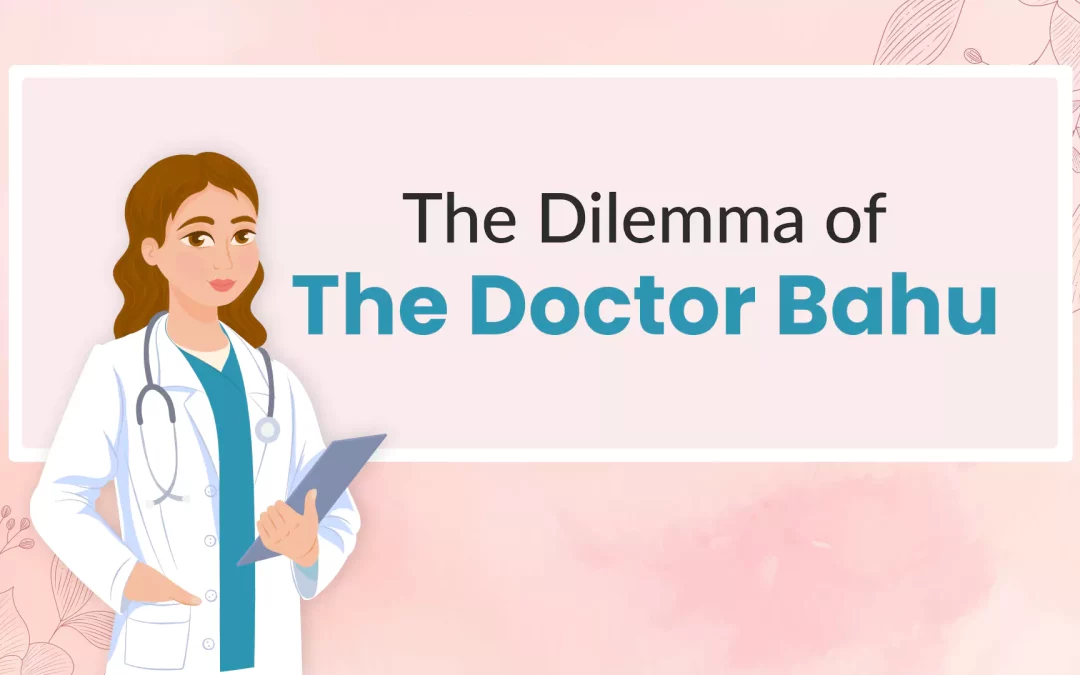In Pakistan, the vast majority of female medical students who graduate as doctors never work as active medical professionals. Given the numerous contributing factors that many critics have identified, this phenomenon is most definitely not new. As a team, we are constantly looking for new ways to explain social issues more effectively. Which aids in our understanding of the situation. Let’s scrutinize our topic for today, “The dilemma of the Doctor Bahu”
Until recently, two professions, medical and engineering, were of great importance. When questioned, girls stated that they wanted to become doctors, while boys wanted to become engineers. Although girls are now entering other professions, medicine still holds its place. Majority of female medical students who graduate and go on to become doctors. But never actively participate in the medical workforce after marriage.
According to the statistics in Pakistan, approximately 85,000 female medicos are currently not in practice. The world is about to enter 2023. But the question of whether or not girls should work after marriage is still up for debate.
Reasons to pursue career in medicine
There are numerous reasons why girls choose to work in medicine. First of all, it’s crucial for girls to pursue careers in medicine because most patients prefer female physicians.
Second, women are seen as being respected and safe in this field. In some families, there is a strong propensity to become physicians. Another reason why some girls choose this profession is because all of their parents’ or siblings’ jobs are in medicine. It is generally acknowledged that children who have access to both material and intellectual resources are more likely to succeed as adults.
Third, some people think there are more opportunities for financial gain in this line of work. You could work in a private hospital or clinic. You can run a hospital or open your own clinic even if you work for the government.
Another theory holds that since female clinicians tend to be more sensitive, emotionally stable, and caring by nature, clients prefer to see them.
Compared to their male counterparts, they have better patient connections. Patients and their families hold female doctors in the highest regard out of love, hope, and awe. due to the fact that they have the power to put an end to physical pain and even bring the dead back to life.
This makes medicine a truly noble profession. It also applies to the fact that many doctors, especially female doctors, go above and beyond what is expected of them.
Being a doctor is also a source of pride in the society. Some girls and parents also believe that female medical practitioner face no issue in finding a good match.
Undoubtedly, this is not a brand-new phenomenon. Numerous critics have drawn attention to the various factors that affect the proportion of women who are encouraged to pursue careers in medicine. The stated motivation for doing this is to raise their social standing and attract marriage proposals.
Being a medical practitioner entitles you to become a member of selective community. Medical field is also fascinating. There are undoubtedly countless more reasons than those mentioned here for choosing a career in medicine. and pursue a medical education. But after that, the real issue starts to emerge.
Obsession for the Doctor Bahu
Some families and boys want a clinician as their future wife. Just as parents want their daughter to become a doctor. This desire has many justifications. Their standing in the community rises. They proudly introduced the surgeon bahu to their family. They believed that having a doctor in the house would allow for effective treatment of routine medical emergencies without the need to rush to the emergency room.
The boy wants to marry a doctor if he is a medical specialist as well. He wants the two of them to work together. Additionally, it raises his reputation and honor. When a wife is a doctor, a husband is in a good position. They can share the admiration and affection that people typically have for their spouse. You understand that your spouse has the ability to significantly impact the life and wellbeing of another person. For a husband, this is a source of great pride.
In some families, the issue of wanting a physician bahu but objecting to her employment, arises. Such attitudes, which hold that a girl’s primary responsibilities are her home and her children, are common among many families. Who appear to be modern and educated as well as traditional and primitive thinkers. Cultural norms favor the doc bahu but forbid them from holding a professional position in their field.
Doctor bahu phenomenon
Despite recent advancements, Pakistan’s female labor participation rate remains at 25%. This is noticeably lower when compared to countries with comparable gross national income per capita. Despite the fact that between 80 and 85 percent of students in Pakistan’s medical colleges are female. There are only 44% women among those who have registered with the Pakistan Medical and Dental Council (PMDC).
The main reason why Pakistani women choose to become doctors are to improve their chances of finding a husband. We cannot ignore the commitment to service either. Numerous opportunities exist in this sector to assist people. The majority of women enter the medical profession but unable to work after marriage.
An impediment to a female continuing her medical career
The medical field is demanding. Saving a human life is only one aspect of it; it also covers how to treat the sick, deal with emergencies, etc. In addition to caring for their patients, female doctors must also look after their families. Many doctors have an unspoken preference to wed other medicos because they will be more understanding of their professional struggles.
However, there are some people who place a high value on the established roles of the family and are steadfastly family-oriented. And might not want to marry a doctor merely for show. Moreover, many boys are subject to parental pressure from parents who want a nurse wife for their medical practitioner son.
One concern is whether or not the girl will be permitted to work. The other is, women currently make up 70% of the student body in Pakistan’s medical colleges. After graduation, only 50% of them go on to work as professionals.
According to research, nearly 40% of female doctors switch to part-time schedules or stop practicing after completing their residencies. A girl devotes more than ten years of her life to perfecting a skill. But she is unable to continue it after marriage. Or decides to work in another field, like education.
Physician shortage due to lack of female doctors
In this case, the rights of the boys were violated. Because the girls’ volume made it impossible for them to get into the medical school. In the nation, there are only 0.83 doctors for every 1,000 people. Additionally, it is widely acknowledged that a dearth of female physicians is the primary cause of this shortage.
Structural barriers
However, a few women believed that getting married made it harder for them to practice medicine. Which makes sense given the obligations and unpredicted consequences that marriage can have. No mother would ever want to leave her child behind. No one else can raise a child the way a mother can.
Faced with these structural obstacles, women frequently decide against pursuing careers. Not because they want to, but rather because they have to. The solution is to remove the structural barriers that exist in medicine for women by raising the salaries of trainee physicians, women may continue to practice and work after getting married. And providing them facilities like flexible work schedules and daycare.
We have now finished our conversation. We’d like to ask some questions.
“How to deal with this doctor bahu dilemma?”
“How should a medical practitioner bahu handle this situation?”
“Should girls pursue careers in the medical field after marriage?”
Additionally, we advise reading our other blog post on the subject.


Truly said. lakin aaj kal koi Doctor khidmat k liye thori banta hai, paisa kamaney k liye banta hai.
The last article you wrote was quite different. So, what are you writing now?
Lerkiyon k Doctor banne per itraz nai laken aurat ko housewife hi hona chaiye. ager wo job karey gi to bachey or gher neglect ho ga. ya phir joint family ho. jahan bachon ki dekh bhal k liye gher k barey mojod hon.